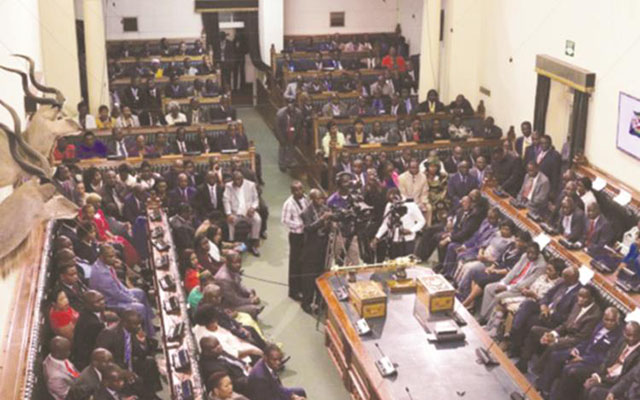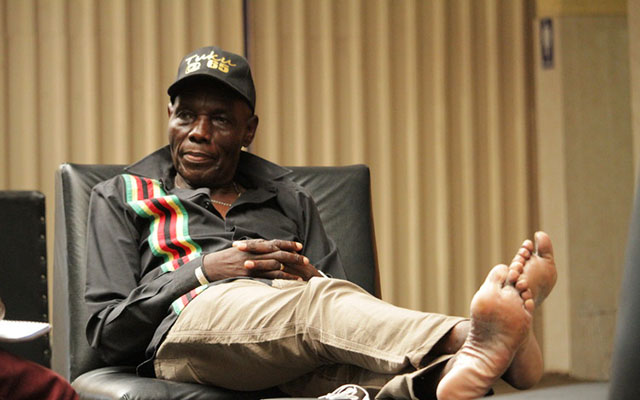MPs’ forex demands outrageous


Backbenchers should be preoccupied with how foreign exchange generation could be enhanced rather than demand to have the scarce commodity
Zvamaida Murwira Mr Speaker Sir,
A fortnight ago Members of Parliament made a sensational demand that their outstanding allowances and Constituency Development Fund (CDF) be paid in foreign currency to ward off the effects of inflation on bond notes. Mr Speaker Sir, without taking anything away from the legislators, the demand to have their payment made in hard currency leaves one wondering whether the legislators are committed to serving the people or want self-enrichment.
There is no doubt, Mr Speaker Sir, that the MPs are entitled to what is due to them both in terms of their outstanding allowances, fuel coupons and CDF, among other contractual agreements. The MPs also had a good case when they said they use their personal resources to fund some activities in their constituencies that include payment of school fees and helping to bury deceased people in their constituencies. In making their case, backbenchers have made a comparison with those in the Executive, ministers and deputy ministers whom they said were entitled to at least two vehicles each, among other benefits, while they only got one vehicle for their entire five-year term. This, in their view, is unfair, and to use their own words, they claim that the Executive is treating them as “cousin brothers”.
They went on to argue that the Constitution provided that the three arms of the State – the Executive, Judiciary and the Legislature – were equal. All that, Mr Speaker Sir, sounds legitimate What is surprising, however, is the demand that they be paid in foreign currency. For those who might have missed the story, backbenchers, led by Norton MP Mr Temba Mliswa (Independent), demanded that they be paid in foreign currency their outstanding allowances and CDF.
“I asked yesterday as to in what currency are we going to be given our outstanding money because our country says one US dollar is equal to the bond notes but what is happening on the ground is the opposite,” said Mr Mliswa.
“We want the Government to disburse this money in US dollars and not in RTGS or bond notes which requires one to top up with a certain percentage. The rate of depreciation of the US dollar is far much better compared to bond notes. We want this consideration to be taken on board that this CDF be disbursed in foreign currency.” To buttress his point, Mr Mliswa said he had gone to buy iron sheets for roofing which he said were pegged at $11 only to return the following day to establish that they were now going for $24.
Zanu-PF Chief Whip Cde Lovemore Matuke wrapped up the debate by saying he hoped that this issue, together with a cocktail of other demands they were making, would be addressed. While at face value their argument that the value of money, particularly the bond notes, was being eroded, appear to be based on sound logic, closer analysis brings into question the prudence of their demands. The question that ought to be asked is, Mr Speaker Sir, how do they want the electorate and taxpayers to view them?
Do they genuinely believe that the electorate would believe that by demanding payment in hard currency they have a good case, given the precarious position the country faces with foreign exchange, and considering that no one else is earning hard currency? Mr Speaker Sir, as presiding officer, you are always on record as encouraging legislators to help the Executive in mobilising resources particularly on the domestic front. One would have expected legislators help the Executive with ideas on how to ensure that the national cake grows bigger.
The question therefore is how do backbenchers expect Government to get foreign currency particularly for consumptive purposes, when already several productive projects to do with infrastructural development are limping owing to scarcity of the greenback. It is not in doubt, Mr Speaker Sir, that backbenchers know the foreign currency situation in the country given that Government ministers appear before their portfolio committees giving in-depth details about the national economic situation.
This is coupled by the weekly Question Time where individual backbenchers pose questions on any area or their constituency. Mr Speaker Sir, backbenchers should be preoccupied with how foreign exchange generation could be enhanced rather than demand to have the scarce commodity. It goes without saying that legislators, as representative of the people, mostly the downtrodden, should have a human face rather than demand that they get priority in the little forex that is avail- able. The electorate would, therefore, Mr Speaker Sir, be forgiven for taking the view that legislators are not there to represent them but to push for their own interests in the form of rich pickings.
It ought to be stated that legislators have a social contract with the electorate to represent them and no objective member of the electorate would view such demands as consistent with the confidence that would have been reposed in them by the electorate. Taxpayers toil day and night to get the bond notes which are even harder to get from financial institutions. What the lawmakers have demonstrated, with all due respect, is a superiority complex that deviates from their core mandate of representing the people.
If the MPs were to get foreign currency for their allowances when the rest of the people are getting bond notes, does that sound to them as making economic sense? The MPs should get whatever the electorate are getting so that they understand the gravity of the foreign currency shortages. Everyone is affected by foreign currency shortages and MPs should not be an exception.









Comments